Harness the Power of the Sun:
Invest In Solar Energy
Solar energy harnesses the sun’s power to generate electricity using solar panels. This clean, renewable resource reduces carbon emissions and reliance on fossil fuels. As technology advances, solar power becomes more accessible, offering energy savings and promoting sustainability. For residential or commercial use, solar energy is a forward-thinking solution for today’s energy needs and future environmental protection.

The Growing Importance Of Solar Energy
As the world seeks sustainable energy solutions, solar energy stands out for its vast potential and minimal environmental impact. Utilising the sun’s power, a virtually inexhaustible resource, solar technology offers a significant reduction in greenhouse gas emissions and a way to mitigate the impacts of climate change. This shift towards renewable energy not only supports environmental conservation but also encourages economic growth through new technologies and job creation in the green energy sector.
Exploring the Potential of Solar Energy
Solar energy harnesses the power of the sun, transforming it into a clean, renewable energy source. By converting sunlight into electricity using photovoltaic (PV) cells, solar panels provide a sustainable alternative to fossil fuels. This process not only reduces greenhouse gas emissions but also lowers energy costs. Solar energy systems can be integrated with battery storage, ensuring a consistent power supply even during non-sunny periods. As technology advances, solar energy becomes more efficient and accessible, making it a vital component of our move towards a greener future.


Understanding Solar Panels
Solar panels are the heart of any solar energy system. They work by capturing sunlight with photovoltaic (PV) cells and converting it into electricity. These panels are made from semiconductor materials, usually silicon, which generate an electric current when exposed to sunlight. Solar panels can be installed on rooftops, ground mounts, or other structures to maximise exposure to sunlight. Advances in technology have made solar panels more efficient and affordable, enabling more homeowners and businesses to adopt this sustainable energy solution. With minimal maintenance, solar panels provide a reliable, eco-friendly power source for years.
The Advantages of Solar Batteries
Investing in solar batteries provides numerous advantages that can transform the way you harness and use energy. Let’s explore these advantages:

Energy Independence
Solar batteries allow you to use energy that you have generated yourself. This provides you a sense of energy independence and decreases your dependency on the grid,making you less vulnerable to rate increases and grid outages.
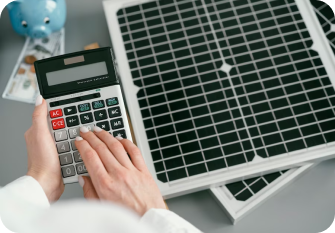
Cost Savings
Solar batteries can drastically cut your electricity expenditures. You can reduce your reliance on pricey grid power by employing stored solar energy during peak electricity pricing hours. These savings can eventually cover the cost of installing the solar system.

Increased Use of Renewable Energy:
By storing extra solar energy, you maximise the use of your solar panels, increasing the proportion of renewable energy in your total energy consumption. This reduces your carbon footprint and contributes to a more sustainable world.
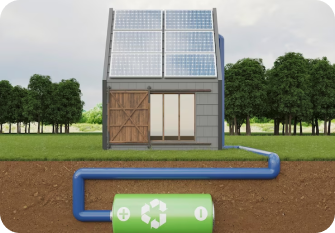
Reliable Backup Power:
Without batteries, grid-connected solar systems stop producing power during a power outage. However, with a solar battery, you may continue to use your solar energy, offering a dependable supply of backup power whenever you may need it.
Why Should You Invest in Solar Batteries?
Harnessing solar energy has never been more crucial or rewarding than today. With worldwide trends favouring sustainable living and renewable energy, investing in solar batteries makes sense for a variety of reasons:

Sustainability:
By selecting solar batteries, you can align with global sustainability goals, lowering carbon emissions and contributing to a better planet.

Advancements in Technology:
Modern solar batteries, such as lithium-ion batteries, offer great efficiency, long lifespan, and outstanding energy storage capacities. Because of its decreasing cost and rising efficiency, now is an excellent time to invest in this technology.

Government Incentives:
There are several government initiatives and incentives available to anyone who wants to switch to solar energy. This includes tax breaks, rebates, and subsidies, making solar batteries even more affordable.

Long-Term Savings:
While the initial investment may be the main point of discussions around solar energy, the long-term savings from lower electricity bills and energy independence make it a worthwhile investment.

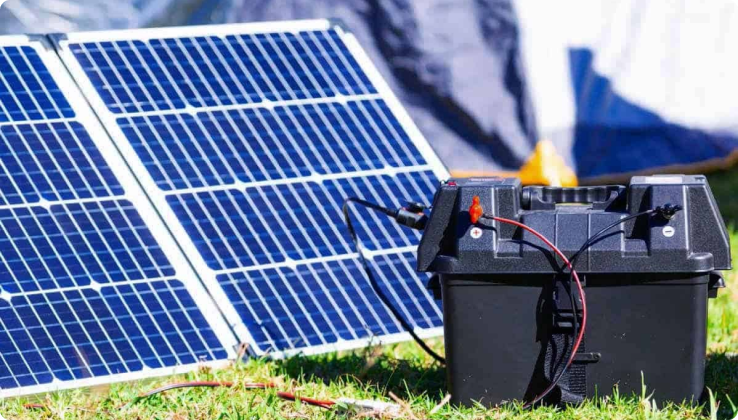
How Solar Panels And Batteries Work Together
Solar panels convert sunlight into electricity using a technology called photovoltaics. This electricity is in a form called direct current (DC), which most home appliances can’t use. That’s where an inverter comes in; it transforms DC into alternating current (AC), the type of electricity used in your home.
Solar batteries play a crucial role by storing any excess electricity your solar panels generate during the day. This stored energy can be used at night or during cloudy days, ensuring that you have a consistent and reliable energy supply. Together, these components form a system that not only reduces reliance on traditional power grids but also maximises the utility of solar energy.
UNDERSTANDING THE TYPE OF SOLAR BATTERY
When it comes to solar batteries, there is one type we recommend, the Lithium battery.
![]()
Lithium-Ion: Due to its high efficiency, lifespan, and decreasing cost, lithium-ion batteries are currently the most preferred alternative for solar energy storage. They offer a high discharge depth and outstanding energy density, allowing you to use more of your battery’s capacity.
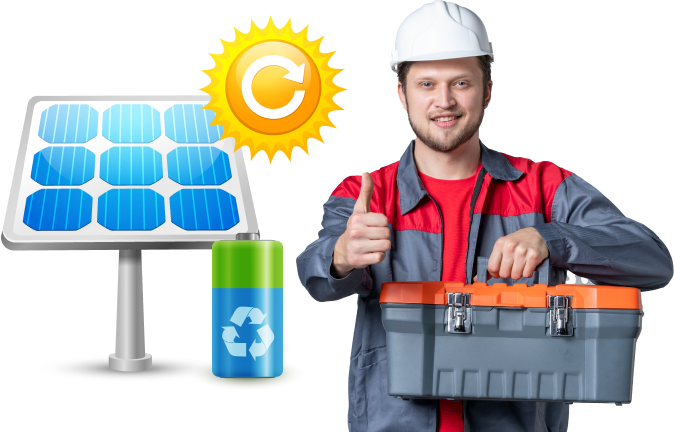
How to Select the Best Solar Battery
When selecting a solar battery for your system, keep the following variables in mind:
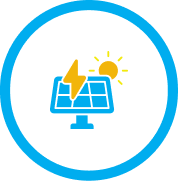
Capacity & Power:
The capacity of a battery tells you how much energy it
can store in kilowatt-hours (kWh), while the power
rating tells you how much electricity it can give at one
time in kilowatts (kW).

Lifespan & Warranty:
Determine how long the battery is projected to live or
cycle, as well as the manufacturer’s warranty.
The battery should live long enough to pay for itself
while also saving you money.
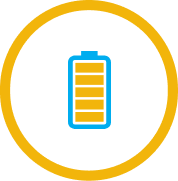
Depth of Discharge (DoD):
Because most batteries must retain some charge at all
times, the DoD shows how much of the battery’s
capacity has been consumed. A higher DoD indicates
that more of your battery’s capacity may be used.
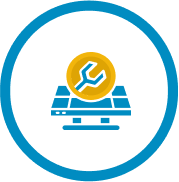
Installation and Maintenance:
Assess the battery’s installation and maintenance
requirements. Lithium-ion batteries often require less
maintenance than lead-acid batteries.
Solar Batteries in the Future
Solar batteries have a bright future. Solar batteries will become more efficient, affordable, and prevalent as technology advances. Significant improvements in capacity, power, lifetime, and recyclability are predicted.
Also on the increase is the concept of virtual power plants, in which stored energy in household solar batteries is returned to the grid at peak hours. This not only decreases grid pressure but also allows households to profit from extra power.
The Game-Changer
Solar batteries are a major game-changer in the world of renewable energy, moving us towards a greener, more sustainable future. They offer a fantastic opportunity to not only lower your carbon footprint but also considerably reduce your energy expenses.
Investing in solar batteries means investing in the future — your future and the future of the world. Begin your journey to sustainable living and energy independence right now. By making this decision, you are not only harnessing the power of the sun, but also contributing to a cleaner, greener planet for future generations.
There is no better time to invest in solar batteries in a world that is more aware of the need to switch to sustainable energy. Making the switch helps to create a cleaner, greener Earth while also ensuring energy independence. It’s a win-win situation for both you and the environment. So, let us harness the power of the sun today with solar batteries!
Faqs
What exactly are solar batteries and why should I consider them for my home?
Solar batteries are essential components of solar energy systems, storing surplus energy generated by solar panels during the day for use when the sun isn’t shining, such as at night or during cloudy days.
How do solar batteries improve the utility of solar energy for me?
Solar batteries transform solar energy from a volatile source to a consistent and dependable one, allowing you to use solar power even when the sun isn’t shining.
I've heard about energy independence with solar batteries. What does that mean for me?
Energy independence means reducing your reliance on the grid, making you less vulnerable to rate increases and grid outages, and allowing you to harness and use solar energy more effectively.
Why should I invest in solar batteries for my solar system?
Investing in solar batteries offers numerous advantages, including a sense of energy independence, cost savings, reduced carbon footprint, and a reliable backup power source.
What type of solar battery is recommended for my solar setup?
The Lithium battery is highly recommended due to its high discharge depth, outstanding energy density, and typically requiring less maintenance than other battery types.
How can solar batteries save me money in the long run?
By using stored solar energy during peak electricity pricing hours, you can reduce your reliance on expensive grid power, leading to significant savings that can cover the cost of the solar system installation.
I'm concerned about the environment. How do solar batteries contribute to a greener future?
Solar batteries reduce your carbon footprint, promote the use of renewable energy, and contribute to a more sustainable world, making them an eco-friendly choice.
How do solar batteries help in achieving energy independence for my household?
Solar batteries allow you to store excess energy generated by your solar panels, reducing your dependency on the grid and providing a consistent power source even during grid outages.
What are the key benefits of switching to solar energy?
Solar energy reduces reliance on fossil fuels, lowers electricity bills, and decreases carbon emissions. That means that you are doing your bit for the environment while also saving money.
How do solar panels and batteries work together to power a home?
Solar panels generate electricity from sunlight, which is stored in batteries for use when the sun isn’t shining. This ensures you have power for your home, no matter the weather or time of day.
What should I consider when choosing a solar battery for my home?
Consider the battery’s capacity, power rating, lifespan, warranty, and maintenance requirements. Every home is different and requires a unique approach to solar power.
Can solar energy systems power a home during a blackout?
Yes, if the system includes batteries, it can provide power during a blackout. Batteries are there to provide power when other methods are not available.
How long does it typically take to see a return on investment from a solar energy system?
The payback period can vary but typically ranges from 5 to 10 years, depending on usage and local incentives. However, this does vary depending on your unique situation.


